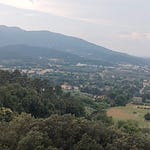There’s a point in childhood when your awareness comes into tune with the coordinates of grown-up reality. The stories on the news are no longer an irrelevant blur, but something you try to make sense of. Years ago, some friends of mine set up a site called First Political Memory, and what’s striking about the stories they collected is how they map this moment in development. The chances are, your first political memory will come from around the age of eight.
I thought about this last night when
took me back to his memory of when the Braer oil tanker ran aground off the coast of Shetland in 1993. At that moment, he said, there was a sense that environmental problems were being dealt with, whether it was the resulting oil slick or the CFCs creating a hole in the ozone layer. And as he told this story, it occurred to me that the two of us book-end those years which represent in many ways the high tide of international concern and intergovernmental action around the environment. Because my own first political memories come from the spring of 1986, when a reactor at Chernobyl caught fire, sending a plume of radioactive smoke drifting across Europe.Jay describes how he arrived at the beginnings of Solarpunk via involvement in the Climate Camp activism of 2006-10 and a passage through the early years of Dark Mountain, which gave him “the idea that there is going to be a future, regardless of what happens, and that we need to face it with open eyes.” In the course of our conversation, we draw out some of the history of these projects with which the two of us have been associated – and the zone of overlap, as well as the differences of focus or emphasis.
As usual, the questions from paid subscribers took us deeper into the territory examined during the first part of the conversation. To watch the full recording, including the Q&A, you’ll need a paid subscription to Writing Home – which is also your ticket to join us live for the fifth in this season of “overheard conversations” when I’ll be talking to Deepa Patel about her adventures in Sufism, slowing down London and why she wants to be a “secret agent”. That session will be on Sunday 5 May at 8pm CEST. (Check your local time here.)
Shownotes
You can explore Jay’s work on his website, thejaymo.net – while your first stop for exploring all things #Solarpunk is solarpunks.net, followed by the solarpunk reddit.
Adam Flynn’s early Solarpunk essay, ‘On the Need for New Futures’.
John Michael Greer has made the point in lots of places that modern Western culture is good at imagine progress and “our destiny in the stars”, or a sudden collapse that is the mirror image of progress, but has a harder time imagining – in the title of one of his books – The Long Descent.
‘The Village and the Shaman’ is
’s report from her first encounter with Dark Mountain, capturing the liminal role of the project.Arizona State University’s Project Hieroglyph – downstream of Neal Stephenson’s call for a return to inspiration in science fiction – was the context for Flynn’s ‘Solarpunk: Notes toward a manifesto’.
Paul Graham Raven makes the suggestion that future narratives allow ideas to be “tested to destruction” with few or no real-world consequences in ‘Imagining the Impossible’.
Madeline Ashby: “Talk, loudly and frequently and in detail, about the future you want. You can’t manifest what you don’t share.”
“To be radical requires a theory of how this world, for all its problems, contains and is fostering the beginning of another, very different world” – Jedediah Britton-Purdy paraphrasing Raymond Williams.
Keri Facer talks about the “thick present” in ‘Storytelling for Troubled Times’.
Tyson Yunkaporta’s Right Story, Wrong Story is out soon.












